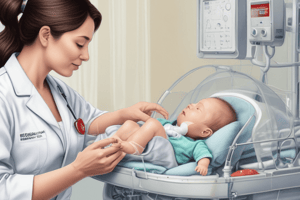Podcast
Questions and Answers
What is the primary focus of this Clinical Guideline?
What is the primary focus of this Clinical Guideline?
- Glycemic control in the neonate receiving parenteral nutrition (correct)
- Glycemic control in pediatric patients
- Glycemic control in adults with type 2 diabetes
- Glycemic control in pregnant women with gestational diabetes
What is a potential consequence of severe hyperglycemia in neonates?
What is a potential consequence of severe hyperglycemia in neonates?
- Respiratory distress
- Cardiovascular disease
- Neurodevelopmental impairment
- Electrolyte imbalance and dehydration (correct)
What is the elevated risk of in neonates receiving parenteral nutrition?
What is the elevated risk of in neonates receiving parenteral nutrition?
- Hyper- and hyponatremia
- Hyper- and hypoglycemia (correct)
- Hyper- and hypokalemia
- Hyper- and hypocalcemia
What is a potential outcome of untreated hypoglycemia in neonates?
What is a potential outcome of untreated hypoglycemia in neonates?
What population is particularly susceptible to the deleterious effects of hyperglycemia?
What population is particularly susceptible to the deleterious effects of hyperglycemia?
Flashcards are hidden until you start studying
Study Notes
Background of Clinical Guideline
- The guideline addresses glycemic control in neonates (within the first month of life) receiving parenteral nutrition (PN).
- Neonates receiving PN are at an elevated risk of hyper- and hypoglycemia.
Risks of Hyper- and Hypoglycemia
- Untreated hyper- or hypoglycemia can lead to undesirable clinical outcomes.
- Prolonged or symptomatic hypoglycemia may result in neurodevelopmental impairment.
- Severe hyperglycemia can cause osmotic diuresis, leading to dehydration and electrolyte imbalance.
Special Considerations for Premature Infants
- Hyperglycemia in premature infants, especially those with very low birth weight (VLBW), may have additional consequences.
Studying That Suits You
Use AI to generate personalized quizzes and flashcards to suit your learning preferences.




